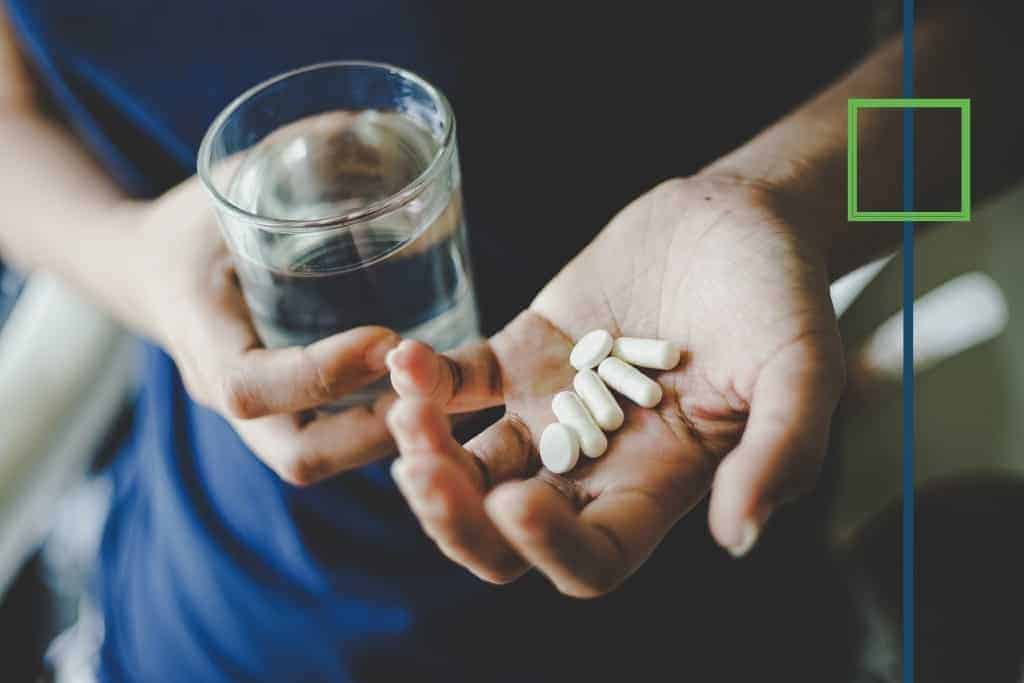What is Opioid Addiction?
According to the Center for Disease Control and Prevention (CDC) [1]. opioid use disorder (OUD) is a problematic pattern of opioid use that causes significant impairment or distress. Opioid use disorder diagnosis is based on the American Psychiatric Association DSM-5 and includes a desire to obtain and take opioids despite social and professional consequences. Opioid use disorder is preferred over other terms with similar definitions, “opioid abuse or dependence” or “opioid addiction.”
Examples of opioids include heroin, morphine, codeine, fentanyl, and synthetic opioids such as oxycodone. Opioid use disorder consists of an overpowering desire to use opioids, increased opioid tolerance, and opioid withdrawal symptoms when discontinued. Opioid use disorder includes dependence and addiction with addiction representing the most severe form of the disorder.


Get Your Life Back
Find Hope & Recovery. Get Safe Comfortable Detox, Addiction Rehab & Dual Diagnosis High-Quality Care.
Hotline(844) 597-1011In the past decade, the opioid epidemic or opioid crisis in the United States has raised public awareness. Opioid use disorders affect over 16 million people worldwide, over 2.1 million in the United States, and there are over 120,000 deaths worldwide annually attributed to opioids [2]. The disease is treated with opioid replacement therapy using buprenorphine or methadone, which reduces the risk of morbidity and mortality. Naltrexone may be useful to prevent relapse. Naloxone is used to treat opioid overdose symptoms. In 2017, opioid overdose was declared a national emergency in the United States. Nonpharmacologic behavioral therapy is also beneficial. Patients with opioid use disorder often benefit from twelve-step programs, peer support, and mental health professionals, individual and group therapy.
What is the difference between “tolerance,” “dependence,” and “addiction”?
Opioid tolerance happens when someone using opioids starts to experience a reduced response to medication, needing more opioids to experience the same effect.
Opioid dependence happens when the body adjusts its normal functioning around regular opioid use. Unpleasant opioid withdrawal symptoms happen when the opioid is stopped.
Opioid addiction (Opioid use disorder (OUD)) happens when attempts to cut down or control use are unsuccessful or when used results in social problems and a failure to fulfill obligations at work, school, and home. Opioid addiction often comes after the person has developed opioid tolerance and dependence, making it physically challenging to stop opioid use and increasing the risk of withdrawal.
Commonly prescribed opioids include:
- Fentanyl
- Oxycodone
- Methadone
- Buprenorphine
- Oxymorphone
- Codeine
- Hydrocodone
- Morphine
Symptoms of Opioid Addiction
The United States possesses an insatiable appetite for the prescription of opioid medications. In 2015, 91.8 million individuals in the United States used prescription opioids [3]. Due to their inarguable abuse potential, these drugs are frequently misused, with high numbers of patients developing dependence. Opioid medications prescribed for mild to moderate acute pain were continued indefinitely, with no intention of tapering or ceasing use. Due to pharmacologic effects, opioids are highly addictive. Tolerance is achieved within days, and the withdrawal syndrome is severe. Seeing how common this drug abuse can be, it is important to know the signs related to opioid addiction.
Mood symptoms
- Hyperactivity
- Depressed mood
- Lack of motivation
Psychological symptoms
- Depression
- Anxiety
- Distorted perception of reality
- Mood swings
- Disorientation
- Loss of concentration
Behavioral symptoms
- Slowed or slurred speech
- Loss of interest in the hobbies and activities that you once enjoyed
- Diminished coordination
- Stealing from loved ones
- Withdrawn socially
Physical symptoms
- Itchy skin
- Diarrhea
- Nauseous
- Vomiting
- Headaches
- Weight loss
- Cramping
Common Signs of Opioid Addiction
- The inability to control opioid use
- Uncontrollable cravings
- Drowsiness
- Changes in sleep habits
- Weight loss
- Frequent flu-like symptoms
- Decreased libido
- Lack of hygiene
- Changes in exercise habits
- Isolation from family or friends
- Stealing from family, friends, or businesses
- New financial difficulties

Get Help. Get Better. Get Your Life Back.
Searching for Accredited Drug and Alcohol Rehab Centers Near You?
Even if you have failed previously and relapsed, or are in the middle of a difficult crisis, we stand ready to support you. Our trusted behavioral health specialists will not give up on you. When you feel ready or just want someone to speak to about therapy alternatives to change your life call us. Even if we cannot assist you, we will lead you to wherever you can get support. There is no obligation. Call our hotline today.
(844) 597-1011What Causes Opioid Addiction?
The causes of Opioid addiction are complex. Many people become addicted to Opioids without knowing that they are using addictive drugs. Unlike illegal drugs such as Cocaine and Methamphetamine, most Opioids are legal medications that doctors prescribe to relieve pain. Therefore, many people who use Opioids and become addicted are neither criminals nor experienced drug users. They are typically ordinary, law-abiding citizens. Although Opioid addiction often begins inadvertently or unknowingly, overcoming opioid addiction requires a personal, long-term commitment to recovery and support from family, friends, and professionals.
Opioid drugs alter the brain by creating artificial endorphins. Besides blocking pain, these endorphins make the user feel good. Unfortunately, too much opioid use can cause the brain to rely on these artificial endorphins. Once your brain does this, it can even stop producing its own endorphins. The longer someone uses opioids, the more likely this is to happen. They also will need more opioids over time because of drug tolerance.
Opioid addiction results from a combination of environmental, genetic, and lifestyle factors, some of which have not been identified. Many of the genes that are thought to play a role in opioid addiction are involved in the endogenous opioid system, the body’s internal system regulating pain, reward, and addictive behaviors. Opioid addiction is a complex disorder, and nongenetic factors also play a critical role.
Factors that have been shown to increase the risk of opioid addiction include:
- A history of substance abuse
- Depression or other psychiatric disorders
- Childhood abuse or neglect
- Certain personality traits, including impulsivity and sensation-seeking
It is likely that a combination of health, social, economic, and lifestyle factors interact with genetic factors to determine an individual’s risk.
How is Opioid Addiction Diagnosed?
Diagnosing opioid addiction requires a thorough evaluation, including obtaining the results of urine drug testing and prescription drug monitoring program (PDMP) reports when opioid addiction is suspected. It is also important to remember that opioid addiction exists on a continuum of severity. As a result, a scale for assigning severity exists and is based upon the number of criteria that have been met (mild, moderate, severe). This severity distinction has opioid addiction treatment implications. The diagnosis of OUD is made by meeting two or more of the eleven criteria in a year time period.

The key elements are as follows:
- Increasing dose/tolerance
- Wish to cut down on the use
- Excessive time spent to obtain or use the medication
- Strong desire to use
- Use interferes with obligations
- Continued use despite life disruption
- Use of opioids in physically hazardous situations
- Reduction or elimination of important activities due to use
- Continued use despite physical or psychological problems
- Need for increased doses of the drug
- Withdrawal when the dose is decreased
Can Opioid Addiction be Prevented or Avoided?
As the U.S. continues to combat the devastating effects of the Opioid Crisis, people are beginning to focus efforts on the prevention of Opioid addiction. Doctors are learning more conservative prescribing practices and how to identify patients abusing the medication. States have implemented prescription drug monitoring programs, and the U.S. Drug Enforcement Agency (DEA) is now offering events where people can learn about the safe disposal of unused prescription medications. Researchers are also looking into other non-addictive alternatives to opioids for pain relief, including anesthetic injections and physical therapy. In addition to safely storing and disposing of all medications, patients can also reduce their risk of Opioid dependence by:
- Closely follow the directions as explained on the label on the medication or by your pharmacist.
- Never stop or change a dosing regimen without consulting your physician.
- Being aware of potential interactions with other drugs as well as alcohol.
- Never use another person’s prescription and never share your prescription medication with others.
First-class Facilities & Amenities
World-class High-Quality Addiction & Mental Health Rehabilitation Treatment
Rehab Centers TourRenowned Addiction Centers. Serene Private Facilities. Inpatient rehab programs vary.
Addiction Helpline(844) 597-1011Proven recovery success experience, backed by a Team w/ History of:
15+
Years of Unified Experience
100s
5-Star Reviews Across Our Centers
10K
Recovery Success Stories Across Our Network
- Low Patient to Therapist Ratio
- Onsite Medical Detox Center
- Comprehensive Dual-Diagnosis Treatment
- Complimentary Family & Alumni Programs
- Coaching, Recovery & Personal Development Events
Opioid Addiction Treatment
There are a variety of approaches to rehabilitation and maintenance of patients with opioid use. Rehabilitation begins with a cognitive-behavioral approach similar to that used in the treatment of other chronic conditions. Maintenance programs should include psychological support. Patients are encouraged and motivated to change through education, reward cooperation, and medications.
The goal of therapy is to minimize drug use relapse. Patients with substance-use disorders are encouraged to participate in self-help programs such as Alcoholics Anonymous and Narcotics Anonymous. The combination of education, motivational enhancement, and self-help groups helps patients change how they think about the ways that opioids affect their lives.
A 12-step program is similar to the alcoholic anonymous program. The program supports behavioral modification through self-help and peer-support programs. The program enforces the idea that addicts must surrender to the fact that they have a chronic addiction that will never go away. Group therapy helps maintain self-control and restraint for patients with substance abuse disorder. Group therapy is cost-effective in comparison to individualized therapy in the treatment of substance abuse.
Opioid replacement, maintenance, or substitution therapy involves replacing an opioid with a longer-acting but less euphoric and addicting opioid. The commonly used drugs are buprenorphine and methadone prescribed and given under medical supervision. The combination of buprenorphine and naloxone is the most widely used.
Living with Opioid Addiction
Opioid addiction is a medical condition. Opioid addiction treatment can help, and recovery is possible. Opioid addiction is a chronic and relapsing disease that can affect anyone. In fact, millions of Americans suffer from opioid addiction. As with most other chronic diseases, addiction is treatable. While no single treatment method is right for everyone, recovery is possible, and help is available for opioid addiction. Preventing overdose death and finding opioid addiction treatment options are the first steps to recovery.

Opioid addiction treatment may save a life and can help people struggling with opioid addiction get their lives back on track by allowing them to counteract addiction’s powerful effects on their brain and behavior. The overall goal of opioid addiction treatment is to return people to productive functioning in their family, workplace, and community. Opioid addiction treatment can vary depending on the patient’s individual needs, occur in a variety of settings, take many different forms, and last for varying lengths of time.
Evidence-based approaches to treating opioid addiction include medications and combining medications with behavioral therapy. A recovery plan that includes medication for opioid addiction increases the chance of success. Medications used in opioid addiction treatment support a person’s recovery by helping to normalize brain chemistry, relieving cravings, and in some cases preventing withdrawal symptoms. The choice to include medication as part of recovery is a personal medical decision, but the evidence for medications to support successful recovery is strong.
World-class, Accredited, 5-Star Reviewed, Effective Addiction & Mental Health Programs. Complete Behavioral Health Inpatient Rehab, Detox plus Co-occuring Disorders Therapy.
CALL(844) 597-1011End the Addiction Pain. End the Emotional Rollercoaster. Get Your Life Back. Start Drug, Alcohol & Dual Diagnosis Mental Health Treatment Now. Get Free No-obligation Guidance by Substance Abuse Specialists Who Understand Addiction & Mental Health Recovery & Know How to Help.
Beyond Detox: Residential Rehab and Dual Diagnosis
Opioid withdrawal symptoms are a life-threatening condition resulting from opioid dependence. When someone stops taking an opioid drug suddenly, the first symptoms of withdrawal can appear within hours. Withdrawal from short-acting opioids like heroin can start within six to 12 hours of the last use and can continue for four to 10 days. The opioid withdrawal timeline varies from a few days to a few weeks, depending on the type of opioid that was used, how long it was used, and any other substances that may have been used in conjunction with opioids as well. Medically managed withdrawal or detoxification ensures the individual remains safe and stays as comfortable as possible.
Detox Treatment
The first step in treatment is detoxification. It will help you navigate the complicated withdrawal process, but it doesn’t address patterns of thought and behavior that contribute to Tramadol abuse. Various treatment approaches and settings can help provide the ongoing support necessary to maintain long-term sobriety after you complete detox.
Cravings are very common during detox and can be challenging to overcome. This often leads to relapse. Constant medical care provided during inpatient treatment helps prevent relapse. Clinicians can provide necessary medication and medical expertise to lessen cravings and the effects of withdrawals.
Psychotherapy
Several different modalities of psychotherapy have been used in opioid addiction treatment, including:
- Cognitive Behavioral Therapy (CBT) – is an effective treatment that involves making changes in both the patterns of negative thoughts and the behavioral routines which are affecting the daily life of the depressed person for various forms of depression.
- Dialectical Behavioral Therapy – is a comprehensive mental health and substance abuse treatment program whose ultimate goal is to aid patients in their efforts to build a life worth living. The main goal of DBT is to help a person develop what is referred to as a “clear mind.”
- Person-Centered Therapy – is a strategy that allows and encourages clients to understand and resolve their concerns in a safe, supportive environment.
Dual Diagnosis Treatment
Substance abuse and mental health disorders often co-occur. In many cases, traumatic experiences can result in a mental health disorder and substance abuse. Dual diagnosis programs treat both of these issues together. The best approach for the treatment of dual diagnosis is an integrated system. In this strategy, both the substance abuse problem and the mental disorder are treated simultaneously. Regardless of which diagnosis (mental health or substance abuse problem) came first, long-term recovery will depend largely on the treatment for both disorders done by the same team or provider.
Medication-Assisted Treatments
Medication-Assisted Treatments (MAT) for substance use disorders and mental health disorders are commonly used in conjunction with one another. This includes the use of medications and other medical procedures. During your rehab, the staff from your treatment facility will help you identify what caused your addiction and teach you skills that will help you change your behavior patterns and challenge the negative thoughts that led to your addiction. Sometimes, the pressures and problems in your life lead you to rely on substances to help you forget about them momentarily.
If you or your loved one is suffering from Opioid withdrawal symptoms and addictions, indeed, help is just a phone call away. Professional opioid addiction treatment is necessary for fast and effective recovery. Contact us today at We Level Up treatment facility. We provide utmost care with doctors and medical staff available 24/7 for life-changing and lasting recovery. We offer an enhanced opportunity to return to a fulfilling and productive life.

Experience Transformative Recovery at We Level Up Treatment Centers.
See our authentic success stories. Get inspired. Get the help you deserve.
Start a New Life
Begin with a free call to an addiction & behavioral health treatment advisor. Learn more about our dual-diagnosis programs. The We Level Up Treatment Center Network delivers recovery programs that vary by each treatment facility. Call to learn more.
- Personalized Care
- Caring Accountable Staff
- World-class Amenities
- Licensed & Accredited
- Renowned w/ 100s 5-Star Reviews
We’ll Call You
Sources:
[1] CDC – https://www.cdc.gov/opioids/basics/terms.html
[2] NCBI – https://www.ncbi.nlm.nih.gov/books/NBK553166/
[3] NCBI – https://www.ncbi.nlm.nih.gov/books/NBK448203/
[4] WHO – https://www.who.int/news-room/fact-sheets/detail/opioid-overdose
[5] NIDA – opioid addiction treatment- https://www.drugabuse.gov/publications/drugs-brains-behavior-science-addiction/treatment-recovery


